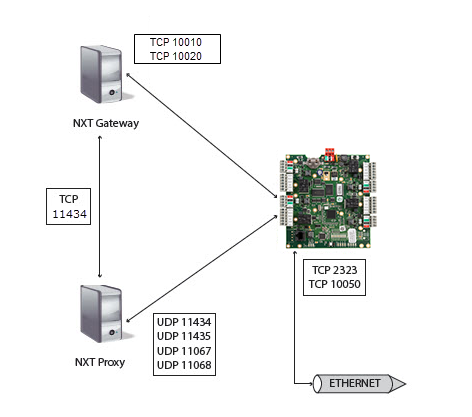Doors.NET - NXT Proxy Service
1.0 Introduction
The Doors.NET NXT Proxy service is the service that looks for and detects the NXT controllers on the network. It supports auto-config 'discovery and assignment' requests and auto-config will not function without the NXT Proxy service.
2.0 Important Port Information
- DoorsNXTProxy listens on TCP/11434 for incoming requests.
- It sends discovery requests to UDP/11434, listening for responses on UDP/11435.
- Responses are echoed back on connected socket from TCP/1143.
- DHCP is configured by the assignment request starts up listening on UDP/11067 and responding to UDP/11068.
- Both TCP/11434 and UDP/11434/11453 use Keri custom protocols. And use standard DHCP protocol, but on custom port numbers 11067/11068.
- Ports 11067, 11068, 11434, 11435 are custom port numbers to Keri NXT controllers.
- TCP/10010 (NXT Command channel) is used by NXT Gateway to discover configuration of already known controllers (including manually added controllers) - in case they are not accessible by UDP on local network, the configuration data is received back on the channel connected to TCP/10010 that would normally be received on UDP/11435 by the proxy.
3.0 Broadcast Messages
DHCP messages may be broadcast or directed (unicast) as appropriate. Because of these UDP broadcast protocols, they are designed to work on a single LAN. The broadcasts won't span networks and usually don't work across VPNs on their own.
4.0 Firewall Settings
Firewalls should minimally allow UDP/11435, 11067 incoming. Additionally they could allow TCP/11434 for remote use (proxy running on one computer, queried from another computer). If a firewall blocks outgoing traffic (not the default), then it should allow TCP/11434, UDP/11434, 11068 outgoing.

5.0 Further Information
Typically, the NXT Proxy service should reside on the same PC as the NXT gateway service.
The NXT and the Neutron controller types require the NXT Proxy service.
Related Articles
Doors.NET - Quick Start Guide
1.0 Introduction This document covers the basic installation and configuration of Doors.NET with Standard NXT, PXL, Entraguard, NXT-MSC (Mercury-Powered) or True Mercury controller types. It assumes that the computer being used for the Doors.NET ...Doors.NET Quick Start Guide - Standalone Document
Doors.NET - Quick Start Guide - Standalone Document (attached)Doors.NET Software Installation - Standalone Document
Doors.NET Software Installation (PDF) P/N:01565-001 Rev G (attached)Setup an NXT Controller
Introduction This document covers the basic configuration of NXT controllers in Doors.NET software. It assumes Doors.NET has already been successfully installed on your host PC, the software license has been activated, and the gateway has been ...Doors.NET Communication Ports
Doors.NET - Ethernet Communication Ports (PDF) P/N: 01248-001 Rev. A (attached)